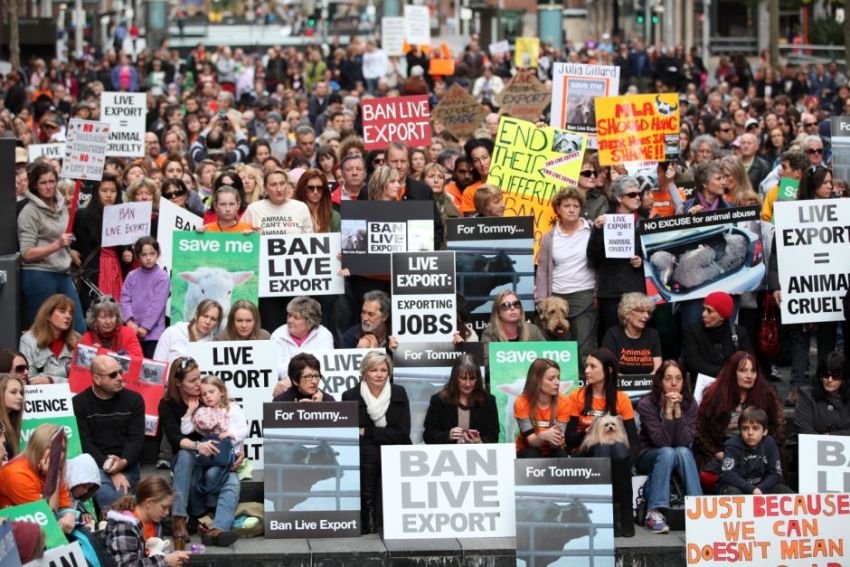
Animals Australia released a video on April 8 that showed sheep suffering horribly on board a ship bound for the Middle East.
The footage apparently even appalled the agriculture minister David Littleproud, who said he was horrified and shocked at what he saw. However, he said the Agriculture Department had investigated the case last year and, according to the minister, gave him a report that was nothing like the reality documented in the video.
This is not the first time such cruelty has been exposed by animal rights groups. Animals Australia said: “Now, thanks to a courageous whistleblower, what is happening to animals on board live export ships has finally been revealed. And it's worse than we'd ever feared.
“Evidence released from five routine voyages shows gentle sheep baking in their own skin, gasping for oxygen, smothered in faeces, unable to lie down to rest, or even reach food or water. It shows what the live export industry has known about and accepted — for decades.”
This is not the first time that large numbers of animals have died on ships belonging to this company — Emanuel Exports. In 2016 more than 3000 sheep died on one of the company's ships.
Both the Coalition and Labor have so far ignored calls for a ban on live animal exports. Obviously the smooth flow of commerce is much more important to them than avoiding the dreadful suffering of animals.
But would a ban on live exports end such suffering? It would certainly eradicate one form of abuse and as the footage demonstrates the abuse is horrendous. However, as long as animals are seen as a commodity from which profits are to be made, animal suffering will continue. There is no guarantee that the slaughter of animals in domestic factories would be humane. There are numerous examples of abuses in domestic abattoirs.
Capitalism not only exploits and oppresses the working class, it also exploits and subjugates animals. Capitalism treats animals as a means to an end — as things to be squeezed for as much value as can be gotten out of them.
For example, animals on factory farms are packed together by the thousands, confined in spaces that allow them little movement and deprived of fresh air and sunlight. Animal waste falls through slats into a collection area below, creating noxious gases. The conditions in these compounds are so toxic that if the exhaust system shuts down, animals quickly begin to die.
These factory farms are not only harmful to non-human animals. Workers in these factories work at furious speeds slaughtering animals. They complain that they are frequently splashed with faeces and urine and that they are treated like machines.
Examples of workers badly mistreating animals, such as punching, kicking and stabbing vulnerable animals, indicates the workers themselves have become dehumanised. The very nature of the meat industry has the effect of dulling empathy for the animals being slaughtered.
An article in the New Internationalist in November 2012 by Chris Grezo, quotes Bill Haw, the CEO of one of the largest feedlots in the US, where thousands of animals are slaughtered every day. Haw explained that “Animals come there to die, to be eviscerated, to be decapitated, to be de-hided — and all of those are violent, bloody and difficult things to watch. So your first and foremost impression of at least the initial stages of the packing house are a very violent, very dehumanizing sort of thing.”
Grezo goes on to state: “There is a theory called the Sinclair Hypothesis and an academic study from 2010 which appears to confirm it. The study shows that when slaughterhouses are introduced to communities as a source of employment, domestic abuse and child abuse increase. What is interesting about the study is that it shows the same effects are not observed when a different type of factory is introduced. Another recent study shows that slaughterhouse workers are more likely to suffer from somatization, anxiety, anger hostility and psychotism than other workers. Other studies have come to similar conclusions, but the subject attracts little interest.”
According to the website Sustainable Table: "Man-made lagoons on industrial farms hold millions of gallons of liquid waste, from which contaminants can leach into groundwater."
Smithfield, the world's largest pork producer, whose massive hog operations have wiped out small farmers in the US, Eastern Europe and Africa, was fined $12.6 million for a toxic spill at a Virginia facility that was twice as big as the Exxon Valdez spill.
With animal products it is not simply the animals who are killed but also the consumers. In the drive to minimise the cost of production unsafe feeding methods lead to diseases, such as salmonella and bovine spongiform encephalopathy and the “mad cow” beef crisis in Britain, breaking out on a wide scale. Even ignoring these outbreaks, there remains the fact that over-consumption of meat has negative impacts on the health of humans, with links to cancer, diabetes and heart disease.
This industry, especially when the capitalist drive for profits has seeped into every aspect of the industry is an inhumane and dehumanising industry that must be stopped.
Like the article? Subscribe to Green Left now! You can also like us on Facebook and follow us on Twitter.